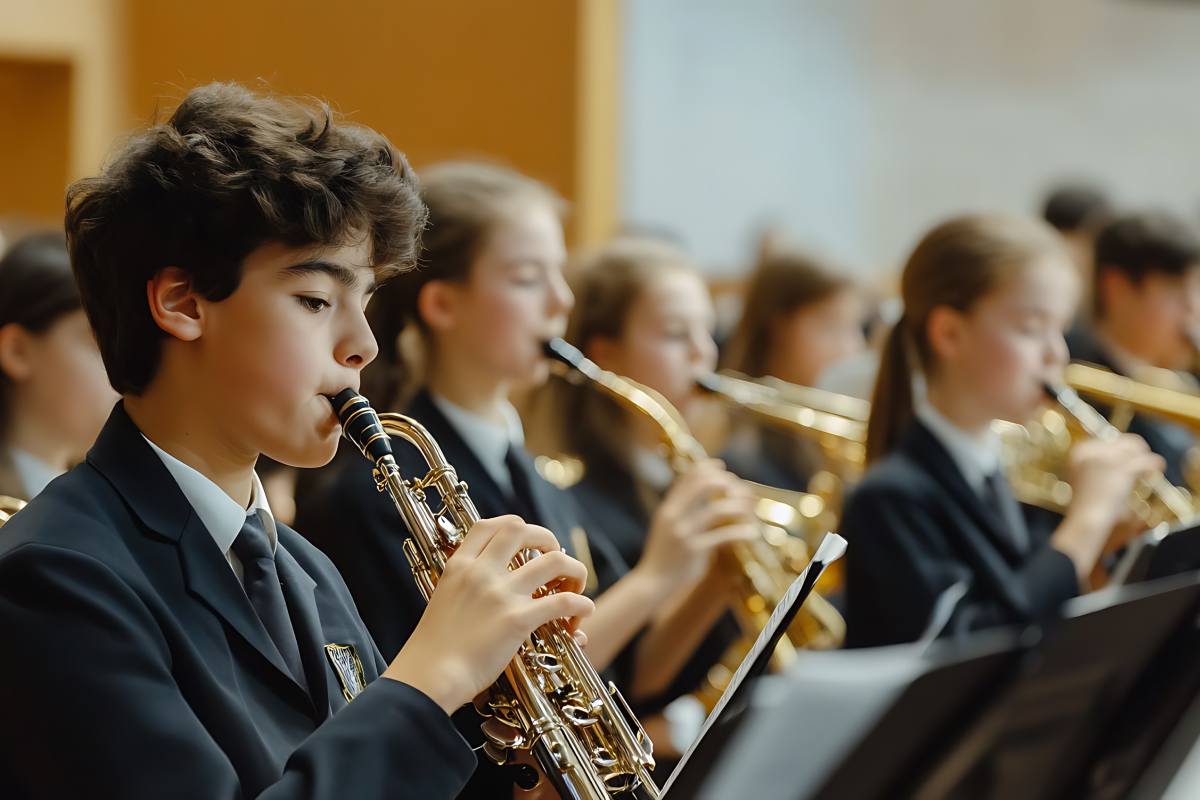The decline in music education within England’s state schools is an ongoing concern. Despite clear evidence of its benefits, music remains under-prioritised in the curriculum, largely due to funding constraints and policy changes, such as the introduction of the English Baccalaureate (EBacc).
Between 2013 and 2023, there was a 30% decrease in students doing music GCSEs and a 43% decrease in doing A-Levels. These alarming statistics raise an essential question: Can playing music boost students’ academic success?
Why Has Music Taken a Backseat?
Music’s decline in state schools is not merely a reflection of shifting priorities but also systemic barriers:
- Curricular Pressure: The EBacc emphasises core academic subjects, often at the expense of creative disciplines.
- Resource Constraints: Many schools lack the funding for specialist teachers or instrumental lessons.
- Inequity: In many cases, music education is becoming a luxury inaccessible to disadvantaged students.
This trend has far-reaching consequences, not only for students’ academic outcomes but also for their cognitive and emotional development.
The Science Behind Music and Cognitive Development
Music is more than an art form; it is a transformative educational tool. Research reveals that playing a musical instrument rewires the brain, enhancing problem-solving skills, creativity, and memory. It strengthens the corpus callosum—the bridge between the brain’s hemispheres—fostering better communication and faster processing.
A key study, Instruments of Knowledge: Music and the Brain (Stoklosa, 2016), highlights how engaging with music can:
- Improve speech processing.
- Boost memory retention.
- Enhance emotional resilience.
By activating multiple brain regions simultaneously, music builds neural pathways that benefit learning across all subjects.
How Music Boosts Cognitive Development in Classrooms
Introducing music into education isn’t just about fostering creativity; it’s about creating capable learners. Here’s how music impacts cognitive development:
- Enhances Problem-Solving: Playing instruments requires quick decision-making and adaptability.
- Improves Reading Skills: Neuroscientific studies link musical training to enhanced phonological awareness.
- Strengthens Memory: Repeated practice of musical pieces improves both working and long-term memory.
- Promotes Emotional Wellbeing: Music fosters resilience and reduces stress, creating a positive learning environment.
- Boosts Focus and Discipline: Mastering an instrument demands sustained attention and perseverance, skills transferable to other areas of study.
Strategies for Reintegrating Music into Education
Reversing the decline of music education requires a collective effort from teachers, schools, and policymakers. Here are some actionable strategies:
- Group Music Lessons: Introduce cost-effective group sessions in primary schools.
- Community Collaborations: Partner with local arts organisations to provide instruments and training.
- Embed Music into Lessons: Use rhythm exercises or musical mnemonics to support learning in other subjects.
- Extracurricular Opportunities: Establish after-school music clubs accessible to all pupils.
- Professional Development: Equip teachers with the tools to integrate music effectively into their classrooms.
Reflection: How Can Music Transform Your School?
Music has the potential to revolutionise education, fostering cognitive, emotional, and social growth in students. As educators, consider these reflective questions:
- How can musical activities enhance engagement and outcomes in your classroom?
- Are there local resources or partnerships that could make music more accessible?
- How might rhythmic or melodic tools improve learning in subjects like maths or languages?
Finally, A Symphony of Success
Reintegrating music into the curriculum isn’t just about preserving cultural heritage; it’s about equipping students with the skills they need for a bright future. Research shows that learning to play an instrument actually reconfigures the brain, improving learning ability for both academic and social success.
It’s time to bring music back to the forefront of education, ensuring every child has the opportunity to thrive.



